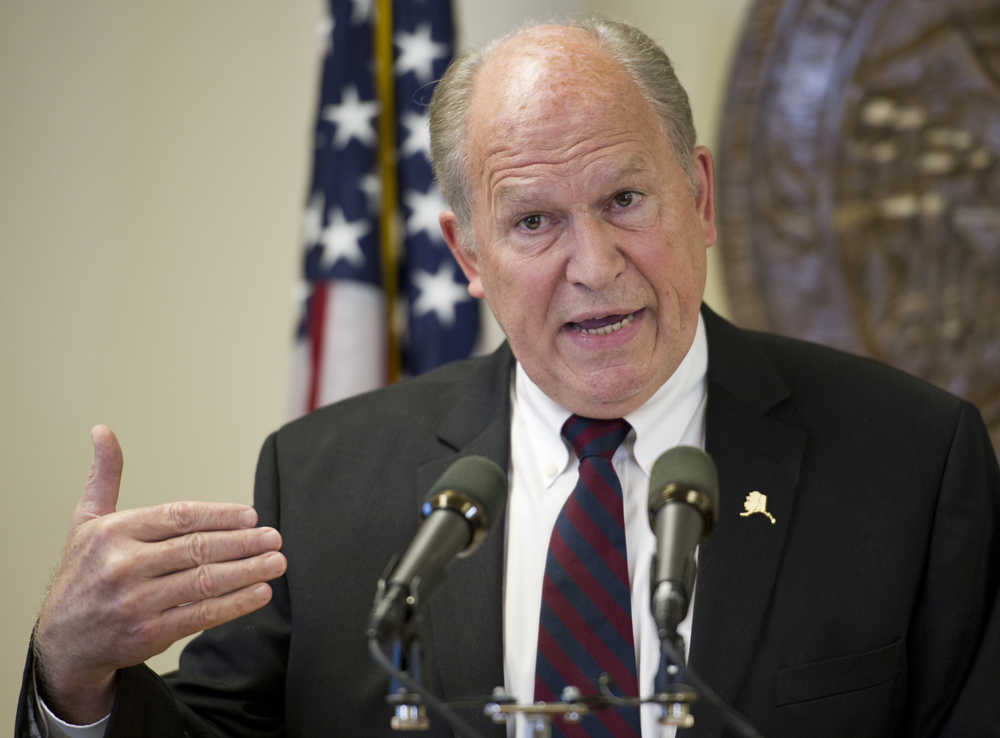Gov. Bill Walker urged lawmakers Wednesday to continue work on the flagship legislation of his 13-point plan to balance Alaska’s multibillion-dollar deficit, tempering his words with a warning that inaction will lead to another special session.
“I do not support a no-action alternative,” Walker said.
On Tuesday, Revenue Commissioner Randall Hoffbeck told the House Finance Committee that if lawmakers failed to act, they likely would see him again soon — implying another special session.
“I think commissioner Hoffbeck was very accurate in that statement,” Walker said.
Walker spoke Wednesday during a press conference at his interim offices in the Community Building on Third Street. The governor and his staff have relocated to the building during construction on the Alaska Capitol. Lawmakers have been working from offices in the Bill Ray Center and meeting for floor sessions in the Terry Miller Building’s converted gymnasium.
Those meetings have become increasingly infrequent as members of the House remain lukewarm about Senate Bill 128, which would divert a portion of the earnings of the Alaska Permanent Fund to pay for state services.
The Senate passed the bill earlier this month, but the measure is stalled in the House Finance Committee, which heard more than three and a half hours of public testimony on Wednesday. According to counts kept by the Empire and other news agencies, more than 60 percent of participants testified against the bill, largely on the grounds that it will halve the annual Permanent Fund Dividend.
Without SB 128, the dividend is expected to be about $2,000 per man, woman and child. With the bill, the dividend will be $1,000.
“It’s not your money, it’s my money,” one woman said during a portion of her Tuesday night testimony.
On the day after, Walker said he understands the struggle lawmakers are going through as they hear from their constituents.
“Their constituents are my constituents,” he said. “I share with them the struggle … but there were no other options than to do this.”
Unless the Legislature acts this year, he argued, it will have no choice but to spend from the account that funds the dividend. The dividend would be eliminated by 2020, barring an unexpected rise in oil prices, steep tax increases or draconian spending cuts.
“I don’t like making any changes to the status quo, but we don’t have the status quo option any more,” Walker said.
Walker’s 13-point plan envisioned tax increases spread across many sectors of Alaska’s economy. The plan was, he has said, to spread the burden to as many people as possible to ensure no one unduly suffered.
In the Legislature, however, the plan has struggled, with eight of the 13 pieces unapproved by either body.
SB 128, written by Sen. Lesil McGuire, R-Anchorage, and adopted by the governor, calls for an annual draw consisting of 5.25 percent of an average value of the Permanent Fund. That average would be calculated by using five of the last six years of Permanent Fund investment returns.
The fund is expected to earn an average of 7 percent returns, and when inflation is subtracted, the draw is small enough that the fund will continue to grow, members of the governor’s cabinet have said.
On Wednesday, Walker was asked by reporters if there is a way to hold the dividend harmless this year — to leave it at the $2,000 level as a compromise for legislators.
“No,” Walker responded.
• Contact reporter James Brooks at james.k.brooks@juneauempire.com.

